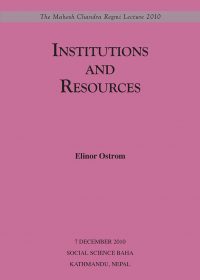Publications
Institutions and Resources
In the contemporary age of massive environmental change, understanding how institutions enhance or detract from the capabilities of those using water, forests, fisheries, and other resources to find and follow sustainable practices is a major policy issue facing leaders in all countries. In past decades, scholars have tended to recommend ‘optimal’ solutions for coping with resources. Examples exist, however, of both successful and unsuccessful efforts to establish government property, private property, or community property. We do know that the absence of any property rights—open access—related to valuable resources is associated with overuse. The resources that research has documented as working well in the field over long periods of time, differ substantially in their design but can usually be characterised as adaptive, multilevel governance systems related to complex, evolving resource systems.
Elinor Ostrom is Distinguished Professor, Arthur F. Bentley Professor of Political Science, and Senior Research Director of the Workshop in Political Theory and Policy Analysis, Indiana University, Bloomington; and Founding Director, Center for the Study of Institutional Diversity, Arizona State University. She is a member of the American Academy of Arts and Sciences, the National Academy of Sciences, and the American Philosophical Society; and a recipient of the Sveriges Riksbank Prize in Economic Sciences in Memory of Alfred Nobel 2009, Reimar Lüst Award for International Scholarly and Cultural Exchange, the Elazar Distinguished Federalism Scholar Award, the Frank E. Seidman Distinguished Award in Political Economy, the Johan Skytte Prize in Political Science, the Atlas Economic Research Foundation’s Lifetime Achievement Award, and the John J. Carty Award for the Advancement of Science. Prof Ostrom’s books include Governing the Commons (1990), Rules, Games, and Common-Pool Resources (1994, with Roy Gardner and James Walker), Local Commons and Global Interdependence: Heterogeneity and Cooperation in Two Domains (1995, with Robert Keohane), Trust and Reciprocity: Interdisciplinary Lessons from Experimental Research (2003, with James Walker), The Commons in the New Millennium: Challenges and Adaptations (2003, with Nives Dolšak), The Samaritan’s Dilemma: The Political Economy of Development Aid (2005, with Clark Gibson, Krister Andersson, and Sujai Shivakumar), Understanding Institutional Diversity (2005), Understanding Knowledge as a Commons: From Theory to Practice (2007, with Charlotte Hess); and Working Together: Collective Action, the Commons, and Multiple Methods in Practice (2010, with Amy Poteete and Marco Janssen).
the-mahesh-chandra-regmi-lecture-2010
